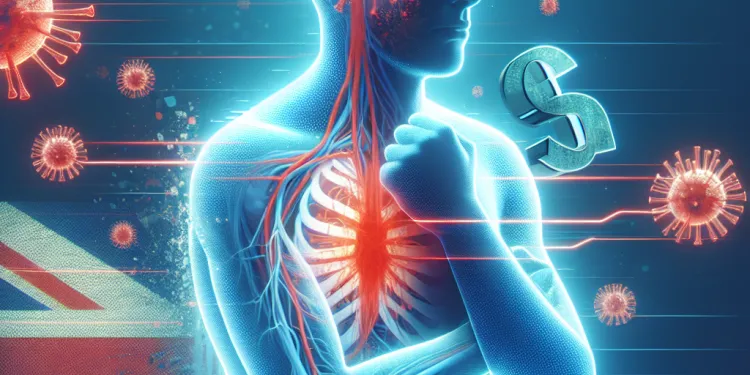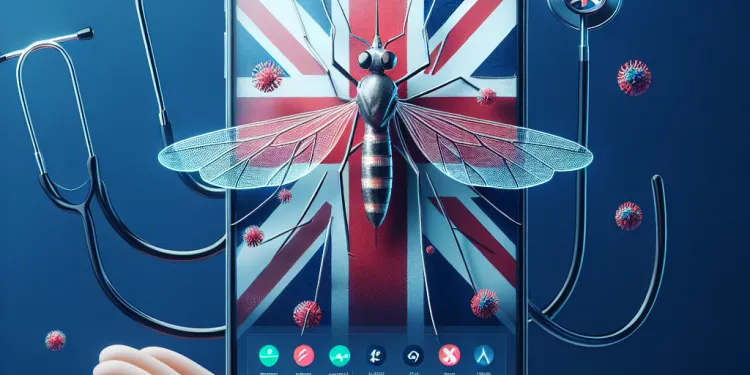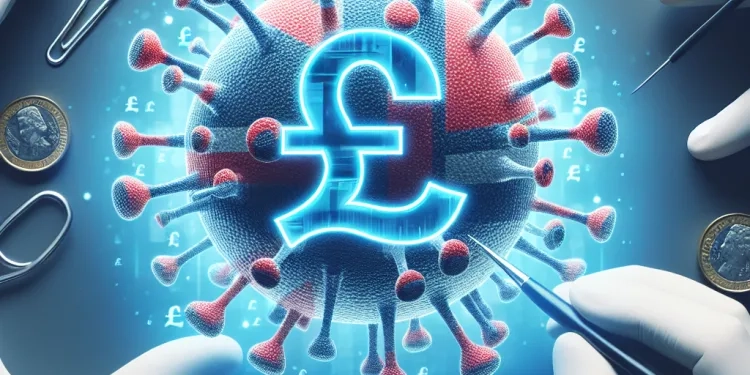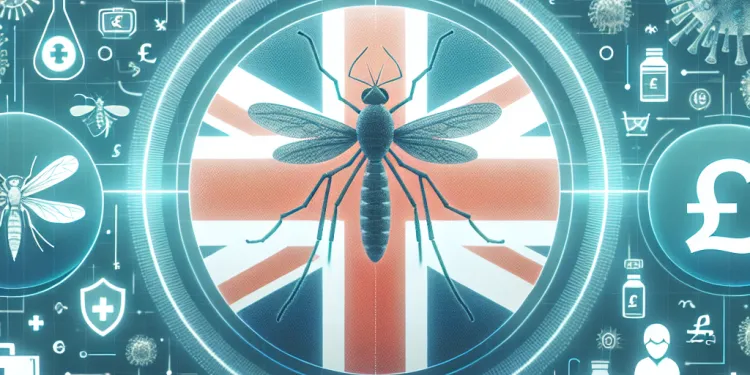
Find Help
More Items From Ergsy search
-

What is Chikungunya virus infection?
Relevance: 100%
-

How is Chikungunya virus infection diagnosed?
Relevance: 99%
-

Can Chikungunya virus infection be treated?
Relevance: 91%
-

How is Chikungunya virus transmitted?
Relevance: 78%
-

Who is at risk for severe Chikungunya infection?
Relevance: 73%
-

Are there any long-term effects of Chikungunya infection?
Relevance: 69%
-

How can Chikungunya virus be prevented?
Relevance: 65%
-

What are the symptoms of Chikungunya virus infection?
Relevance: 64%
-

Can Chikungunya be transmitted from person to person?
Relevance: 59%
-

Is Chikungunya fatal?
Relevance: 56%
-

Is there a vaccine for Chikungunya virus?
Relevance: 54%
-

Where do Chikungunya outbreaks typically occur?
Relevance: 52%
-

What are the symptoms of Nipah Virus infection?
Relevance: 51%
-

Has chikungunya virus been reported in the UK?
Relevance: 51%
-

What is the mortality rate of Nipah Virus infection?
Relevance: 49%
-

How long do Chikungunya symptoms last?
Relevance: 49%
-

What are the symptoms of Zika virus?
Relevance: 47%
-

Can men in the UK transmit Zika virus if infected?
Relevance: 45%
-

What should someone do if they suspect Nipah Virus infection?
Relevance: 44%
-

How is Nipah Virus diagnosed?
Relevance: 41%
-

What preventive measures can reduce the risk of Nipah Virus infection?
Relevance: 41%
-

How is Marburg virus disease diagnosed?
Relevance: 40%
-

Are there treatments for West Nile Virus?
Relevance: 39%
-

How can healthcare workers protect themselves from Marburg virus infection?
Relevance: 38%
-

What is the Marburg Virus?
Relevance: 37%
-

Can Nipah Virus cause neurological complications?
Relevance: 37%
-

Is the Marburg virus related to the Ebola virus?
Relevance: 37%
-

Is there a cure for Nipah Virus?
Relevance: 37%
-

Can animals be infected with H3N2?
Relevance: 36%
-

Do antibiotics work on viral infections?
Relevance: 36%
-

What is Nipah Virus?
Relevance: 35%
-

Can Nipah Virus cause outbreaks?
Relevance: 35%
-

What other viruses are tested for in blood donations?
Relevance: 35%
-

What role do infections play in chronic fatigue syndrome?
Relevance: 34%
-

What is the Ebola virus?
Relevance: 34%
-

Is there a test for West Nile Virus?
Relevance: 34%
-

How is Nipah Virus transmitted?
Relevance: 34%
-

Can Zika virus affect pregnancy?
Relevance: 33%
-

What is West Nile Virus?
Relevance: 33%
-

How is the Zika virus transmitted?
Relevance: 33%
Understanding Chikungunya Virus Infection Diagnosis
Chikungunya is a viral infection transmitted to humans by mosquitoes. Originally identified in Africa in the 1950s, its name translates to "bent over in pain" in the Kimakonde language, a reflection of the debilitating joint pain it causes. In the UK, awareness of this infection is essential for early detection and effective management. Here's how chikungunya virus infection is diagnosed.
Initial Assessment: Clinical Evaluation
When a patient presents with symptoms indicative of chikungunya, healthcare providers begin with a thorough clinical evaluation. Common symptoms include sudden onset of fever, severe joint pain, muscle pain, headache, nausea, fatigue, and rash. The symptoms can overlap with those of dengue and other viral illnesses, making clinical diagnosis challenging based on symptoms alone. A detailed travel history is equally crucial, particularly if the patient has visited regions with ongoing outbreaks.
Laboratory Testing: Confirmatory Diagnosis
Confirming a Chikungunya infection requires laboratory testing, as clinical manifestations can be non-specific. The most direct method to diagnose is through the detection of the virus using reverse transcription-polymerase chain reaction (RT-PCR) in blood samples. RT-PCR is particularly useful in the early stages of the disease, usually within the first week after onset of symptoms, when the virus is present in the bloodstream.
Serological Tests: Detecting Antibodies
As the infection progresses, serological tests become more practical. These tests detect antibodies produced in response to the infection. Immunoglobulin M (IgM) antibodies, which indicate a recent infection, can usually be detected starting from 4 to 7 days after the onset of symptoms and can persist for several weeks to months. Immunoglobulin G (IgG) antibodies, indicative of past infection and developed immunity, also begin to develop a few weeks after infection. Enzyme-Linked Immunosorbent Assay (ELISA) is a common method used to detect these antibodies.
Cross-Reactivity and Differential Diagnosis
Cross-reactivity with other arboviruses, such as dengue and Zika, can occur, complicating serological diagnoses. It's vital to consider the patient's symptoms, history, and potential co-circulation of these viruses in differential diagnosis. Advanced testing techniques and genetic sequence analysis can sometimes differentiate between these infections.
The Role of Healthcare Providers
Healthcare providers in the UK, particularly in travel clinics or infectious disease departments, play a pivotal role in diagnosing chikungunya. Accurate diagnosis can help manage the symptoms effectively and prevent misdiagnosis of conditions with overlapping symptoms. As there is no specific antiviral treatment for chikungunya, supportive care focuses on relieving symptoms, particularly joint pain and swelling.
Conclusion
Although relatively uncommon in the UK, outbreaks of chikungunya elsewhere necessitate awareness and timely diagnosis for travelers and residents. Through a combination of clinical evaluation, strategic laboratory testing, and consideration of recent travel to endemic areas, healthcare providers can effectively diagnose and manage chikungunya virus infections.
Understanding Chikungunya Virus Infection Diagnosis
Chikungunya is an illness caused by a virus. This virus is spread to people by mosquitoes. It was first found in Africa in the 1950s. The name means "bent over in pain" because it makes your joints hurt a lot. In the UK, it is important to know about this illness so it can be found early and treated well. Here's how doctors find out if someone has chikungunya.
Checking Symptoms: What Doctors Look For
If a person has signs of chikungunya, doctors will examine them carefully. Common signs are a sudden fever, very painful joints, muscle pain, headaches, feeling sick, being very tired, and a rash. These signs can be similar to other illnesses like dengue, making it hard to tell just by looking. Knowing where the patient has traveled, especially if they went to places with chikungunya, is also very important.
Testing in the Lab: Making Sure of the Diagnosis
To be sure someone has chikungunya, tests in the lab are needed because the signs can be confusing. The best way to find out is by using a special test called RT-PCR on blood samples. This test looks for the virus itself and works best in the first week after the signs start, when the virus is in the blood.
Antibody Tests: Looking for the Body's Defense
As time goes on, other tests can be used. These find antibodies, which are the body's way of fighting the virus. IgM antibodies show a new infection and can be found 4 to 7 days after signs begin. They can last for weeks or months. IgG antibodies mean the body got infected in the past and is now protected. These start to show a few weeks after getting sick. A test called ELISA is often used to find these antibodies.
Other Infections and Tests
Sometimes, the tests for chikungunya can look similar to tests for other viruses like dengue and Zika. This can make it hard to tell them apart. It is important to think about the patient's signs, travel history, and if these other viruses are around too. More advanced tests can sometimes tell the difference between these infections.
Doctors' Important Job
Doctors in the UK, especially those in travel clinics or who treat infections, are very important in finding out if someone has chikungunya. Knowing for sure helps treat the signs well and stops mistakes with other similar illnesses. There is no medicine that stops chikungunya, so treatment helps with the signs like joint pain and swelling.
Conclusion
Even though chikungunya is not common in the UK, it is important to know about it, especially for people traveling. By looking at signs, doing the right tests, and knowing if a person has been to places with chikungunya, doctors can find and treat the virus more easily.
Frequently Asked Questions
What are the common methods to diagnose Chikungunya virus infection?
Chikungunya virus infection is commonly diagnosed through blood tests that detect virus-specific antibodies (IgM and IgG) or viral RNA.
Is there a specific test for Chikungunya virus?
Yes, Chikungunya virus infection can be confirmed using serological tests to detect IgM antibodies or by polymerase chain reaction (PCR) to identify viral RNA.
What type of blood test is used to confirm Chikungunya virus infection?
Serological tests that detect IgM and IgG antibodies specific to the Chikungunya virus are used, as well as RT-PCR to detect viral RNA.
How soon can Chikungunya virus be detected in blood?
Chikungunya virus can be detected in the blood within the first week of infection using RT-PCR, and antibodies can be detected from around 4-7 days after the onset of symptoms.
Can Chikungunya be diagnosed based on symptoms alone?
While symptoms can suggest a Chikungunya infection, laboratory tests are required to confirm the diagnosis.
Why is it important to distinguish Chikungunya from similar diseases?
Accurate diagnosis of Chikungunya is important due to its symptom overlap with other diseases like Dengue and Zika, guiding appropriate management and treatment.
What role does PCR play in diagnosing Chikungunya virus infection?
PCR plays a crucial role as it detects the viral RNA of Chikungunya, especially useful during the early days of infection.
How reliable are serological tests for Chikungunya virus?
Serological tests are generally reliable if performed after the first week of illness, as IgM antibodies are produced, indicating a recent infection.
Which samples are required for Chikungunya diagnostic tests?
Blood samples are required, either serum or plasma, for both serological and molecular tests to diagnose Chikungunya.
Can Chikungunya diagnosis be confirmed after symptoms have resolved?
Yes, antibodies may persist for several months, allowing for diagnosis through serological testing even after symptom resolution.
How soon should one get tested for Chikungunya after symptom onset?
It's recommended to get tested as soon as possible, ideally within the first week of symptoms, although antibody testing can also be done after this period.
Are there rapid tests available for diagnosing Chikungunya?
Yes, some rapid tests are available but they might not be as reliable as laboratory-based serological or molecular tests.
Can Chikungunya be diagnosed through a routine blood test?
No, specific tests such as serological assays or PCR are required to diagnose Chikungunya.
What factors can affect the accuracy of Chikungunya diagnostic tests?
Timing of sample collection, the quality of the sample, and the specific test kit or technique used can all affect diagnostic accuracy.
Is cross-reactivity a concern in Chikungunya serological testing?
There can be cross-reactivity with other arboviruses like dengue, which may affect test specificity. Confirmatory tests are recommended for accurate diagnosis.
Can Chikungunya be diagnosed in a routine clinical setting?
Yes, with the availability of specific diagnostics such as serological tests or PCR, Chikungunya can be diagnosed in clinical laboratories.
What are IgM and IgG in the context of Chikungunya testing?
IgM antibodies indicate a recent Chikungunya virus infection, while IgG antibodies indicate past exposure or infection.
Is it necessary to repeat the Chikungunya test for confirmation?
If initial results are inconclusive, repeat tests or additional types of testing (e.g., PCR following serology) may be necessary for confirmation.
What is the role of vector control in the context of Chikungunya diagnosis?
While vector control doesn't play a direct role in diagnosis, reducing mosquito populations helps prevent transmission and thus the incidence of new cases.
Can co-infections complicate the diagnosis of Chikungunya?
Yes, co-infections with viruses like dengue and Zika can complicate clinical diagnosis due to overlapping symptoms and potential cross-reactivity in serological tests.
How do doctors find out if you have Chikungunya virus?
Doctors use tests to see if someone has Chikungunya virus. Here are common ways:
- Blood Test: Doctors take a small amount of blood to check for the virus.
- Symptoms Check: Doctors ask questions about how the person feels and look for signs like fever and joint pain.
If you need more help to understand, you can use:
- Visual Aids: Pictures or videos to show how tests work.
- Simple Words: Ask someone to explain it in simple words.
Doctors can find out if you have chikungunya by doing a blood test. The test looks for signs of the virus in your blood.
Can doctors test for Chikungunya virus?
Yes, they can! Doctors have a test to see if someone has the Chikungunya virus.
Here’s how:
- Doctors take a small amount of your blood.
- They check the blood for the virus.
- This helps them know if you are sick with Chikungunya.
Helpful tip: If you think you have Chikungunya, tell a doctor. They can help you feel better.
Tools to help:
- Ask simple questions to your doctor.
- Bring a friend or family member for support.
Yes, doctors can find out if someone has the Chikungunya virus. They do this with special tests. One test looks for parts of the virus in the blood. Another test looks for the body's reaction to the virus. These tests help doctors know for sure if a person has Chikungunya.
What blood test checks for Chikungunya virus?
Doctors use a blood test called "PCR" to find the Chikungunya virus. This test looks for the virus in your blood.
To make reading easier, ask a friend or family member to help. You can also use a ruler or your finger to follow the words as you read.
Doctors use special blood tests to find out if someone has Chikungunya. These tests look for certain things called IgM and IgG antibodies that are made by your body to fight the virus. Another test called RT-PCR can find the virus itself in your blood.
When can we find Chikungunya virus in blood?
You can find the Chikungunya virus in the blood during the first week when someone is sick. Doctors use a special test called RT-PCR to do this. After 4 to 7 days of feeling sick, the body's defense helpers called antibodies can also be seen.
Can doctors know if you have Chikungunya just by looking at your symptoms?
If you feel sick like you might have Chikungunya, doctors need to do special tests to be sure. These tests will tell them if you really have Chikungunya.
Why do we need to tell Chikungunya apart from other diseases?
It is important to know if someone has Chikungunya and not another illness. This helps doctors give the right treatment.
Chikungunya can look like other diseases. It might seem like dengue or Zika. These diseases need different care.
When we know what the illness is, we can help people feel better faster.
To make it easier to understand, you can use pictures or talk to someone about it. You can also ask questions if you are confused.
It is important to know if someone has Chikungunya. Chikungunya can look like other sicknesses, like Dengue and Zika. Knowing exactly helps doctors give the right treatment.
Here are some tools and ways that can help:
- Talking to a doctor or nurse.
- Getting a blood test.
- Resting and drinking lots of water.
- Medicine to help with pain and fever.
How does PCR help find out if someone has Chikungunya virus?
PCR is a test that helps find out if someone has the Chikungunya virus. It looks for the virus in the body early when the person first gets sick. This test is very important.
Can we trust tests that check for Chikungunya virus?
Blood tests can be trusted if they are done after the first week of being sick. By then, the body makes something called IgM. IgM shows there is a new infection.
What samples do we need for Chikungunya tests?
To check for Chikungunya, doctors need to take blood samples. They use these samples for special tests to find out if a person is sick. The blood can be in two forms: serum or plasma.
Can doctors check for Chikungunya after you feel better?
Yes, antibodies can stay in your body for many months. This means doctors can still check if you had the illness, even after you feel better.
When should you get a test for Chikungunya after feeling sick?
If you think you have Chikungunya, it's good to see a doctor. They can help decide when you need a test. Usually, it's best to get tested soon after you start feeling sick.
Here are some tips to make things easier:
- Ask someone you trust to help go with you to the doctor.
- Use a calendar to mark any new symptoms you feel.
- Write down questions you want to ask the doctor.
It is best to get a test as soon as you feel sick. Try to do this in the first week. You can also get a special blood test called an antibody test later on to see if you had the illness.
Are there quick tests to find out if you have Chikungunya?
Yes, there are some quick tests you can use. But these tests might not be as good or accurate as the ones done in a lab.
Can a regular blood test check for Chikungunya?
No, you need special tests called serological assays or PCR to find out if someone has Chikungunya.
What can change how well Chikungunya tests work?
How we collect the sample, how good the sample is, and the type of test kit or method we use can change how well we can figure out what's wrong.
If you need help reading, try using: - Text-to-speech tools, which can read the text out loud. - Pictures that go with the words to understand better. - A highlighter to mark important ideas.
Is cross-reactivity a problem in Chikungunya blood tests?
Cross-reactivity is when a test gets mixed up and thinks one disease is another. This can make test results wrong.
When doctors test for Chikungunya, they want to be sure the test is correct. Cross-reactivity can make this tricky.
If you or someone you know is taking a Chikungunya test, ask your doctor about cross-reactivity. They can help explain and show you what to do next.
It's okay to ask questions. Doctors can use special tests to make sure the results are right.
If you find it hard to understand, you can:
- Ask someone you trust for help.
- Use pictures or drawings to explain things.
- Speak to a doctor or nurse for simple answers.
Sometimes, if you have a similar virus like dengue, it can confuse the test. This makes the test less accurate. It is a good idea to do extra tests to be sure of the results.
Can Doctors Find Out If Someone Has Chikungunya During a Regular Check-Up?
Yes, doctors can find out if someone has Chikungunya with special tests in a lab. These tests are called serological tests or PCR.
If you find reading hard, you can use tools like text-to-speech apps or ask someone to read it with you.
What are IgM and IgG when testing for Chikungunya?
When doctors test for Chikungunya, they look for two things in your blood. These are called IgM and IgG.
IgM shows up first. It can mean you got Chikungunya recently.
IgG shows up later. It can mean you had Chikungunya a while ago.
Doctors use this information to know if you have or had Chikungunya.
If you find reading hard, you can ask someone to read it to you. You can also use a computer or phone app that reads text out loud.
IgM antibodies show you got the Chikungunya virus not long ago. IgG antibodies show you had the Chikungunya virus before.
Do you need to do the Chikungunya test again to be sure?
Here's how we can help:
- Ask your doctor if you need to take the test again.
- Use a calendar to mark test dates.
- Take notes about your symptoms to show the doctor.
- Ask someone you trust to go with you to the doctor.
If the first test does not give a clear answer, you might need to do the test again. You could also try a different type of test to be sure, like a PCR test after a blood test.
How does stopping insects help with finding out if someone has Chikungunya?
Stopping insects like mosquitoes is very important. They spread the Chikungunya virus. When we control these insects, fewer people get bitten. This helps doctors find out if someone has Chikungunya more easily because there are fewer new cases.
Here are some ways to stop insects:
- Use insect spray to keep mosquitoes away.
- Put up nets on your windows and doors.
- Wear clothes that cover your arms and legs.
These actions can help stop the disease from spreading.
Stopping mosquitoes doesn't help doctors find out if someone is sick, but it can stop more people from getting sick. Tools like mosquito nets and bug spray can help keep mosquitoes away.
Can having more than one infection make it harder to find out if you have Chikungunya?
Yes, having two viruses like dengue and Zika at the same time can make it hard for doctors to know what's wrong. This is because the symptoms are similar, and blood tests can be confusing.
Useful Links
This website offers general information and is not a substitute for professional advice.
Always seek guidance from qualified professionals.
If you have any medical concerns or need urgent help, contact a healthcare professional or emergency services immediately.
Some of this content was generated with AI assistance. We’ve done our best to keep it accurate, helpful, and human-friendly.
- Ergsy carfully checks the information in the videos we provide here.
- Videos shown by Youtube after a video has completed, have NOT been reviewed by ERGSY.
- To view, click the arrow in centre of video.
- Most of the videos you find here will have subtitles and/or closed captions available.
- You may need to turn these on, and choose your preferred language.
- Go to the video you'd like to watch.
- If closed captions (CC) are available, settings will be visible on the bottom right of the video player.
- To turn on Captions, click settings .
- To turn off Captions, click settings again.
More Items From Ergsy search
-

What is Chikungunya virus infection?
Relevance: 100%
-

How is Chikungunya virus infection diagnosed?
Relevance: 99%
-

Can Chikungunya virus infection be treated?
Relevance: 91%
-

How is Chikungunya virus transmitted?
Relevance: 78%
-

Who is at risk for severe Chikungunya infection?
Relevance: 73%
-

Are there any long-term effects of Chikungunya infection?
Relevance: 69%
-

How can Chikungunya virus be prevented?
Relevance: 65%
-

What are the symptoms of Chikungunya virus infection?
Relevance: 64%
-

Can Chikungunya be transmitted from person to person?
Relevance: 59%
-

Is Chikungunya fatal?
Relevance: 56%
-

Is there a vaccine for Chikungunya virus?
Relevance: 54%
-

Where do Chikungunya outbreaks typically occur?
Relevance: 52%
-

What are the symptoms of Nipah Virus infection?
Relevance: 51%
-

Has chikungunya virus been reported in the UK?
Relevance: 51%
-

What is the mortality rate of Nipah Virus infection?
Relevance: 49%
-

How long do Chikungunya symptoms last?
Relevance: 49%
-

What are the symptoms of Zika virus?
Relevance: 47%
-

Can men in the UK transmit Zika virus if infected?
Relevance: 45%
-

What should someone do if they suspect Nipah Virus infection?
Relevance: 44%
-

How is Nipah Virus diagnosed?
Relevance: 41%
-

What preventive measures can reduce the risk of Nipah Virus infection?
Relevance: 41%
-

How is Marburg virus disease diagnosed?
Relevance: 40%
-

Are there treatments for West Nile Virus?
Relevance: 39%
-

How can healthcare workers protect themselves from Marburg virus infection?
Relevance: 38%
-

What is the Marburg Virus?
Relevance: 37%
-

Can Nipah Virus cause neurological complications?
Relevance: 37%
-

Is the Marburg virus related to the Ebola virus?
Relevance: 37%
-

Is there a cure for Nipah Virus?
Relevance: 37%
-

Can animals be infected with H3N2?
Relevance: 36%
-

Do antibiotics work on viral infections?
Relevance: 36%
-

What is Nipah Virus?
Relevance: 35%
-

Can Nipah Virus cause outbreaks?
Relevance: 35%
-

What other viruses are tested for in blood donations?
Relevance: 35%
-

What role do infections play in chronic fatigue syndrome?
Relevance: 34%
-

What is the Ebola virus?
Relevance: 34%
-

Is there a test for West Nile Virus?
Relevance: 34%
-

How is Nipah Virus transmitted?
Relevance: 34%
-

Can Zika virus affect pregnancy?
Relevance: 33%
-

What is West Nile Virus?
Relevance: 33%
-

How is the Zika virus transmitted?
Relevance: 33%


